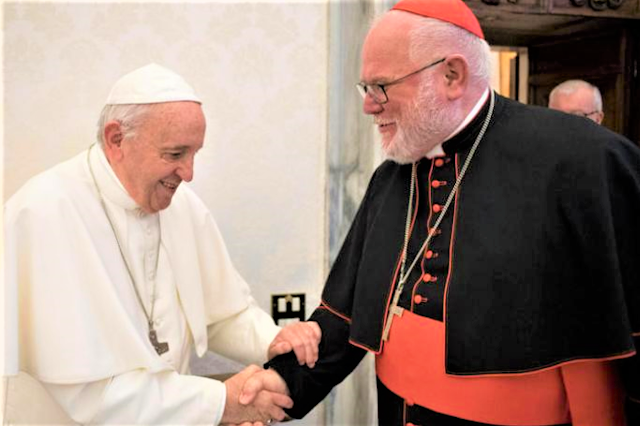MUNICH (GERMANY)
Archdiocese of Munich and Freising [Munich, Germany]
June 4, 2021
By Cardinal Reinhard Marx
[See also the German text of the letter, and Cardinal Marx’s personal declaration. Photo above: Pope Francis received Cardinal Reinhard Marx, Archbishop of Munich and Freising and Coordinator of the Council for Economics, in a private audience at the Vatican on May 27, 2019. Photographer unknown.]
21st May 2021
Holy Father,
Without doubt, these are times of crisis for the Church in Germany. There are, of course, many reasons for this situation – also beyond Germany in the whole world – and I believe it is not necessary to state them in detail here. However, this crisis has also been caused by our own failure, by our own guilt. This has become clearer and clearer to me looking at the Catholic Church as a whole, not only today but also in the past decades. My impression is that we are at a „dead end“ which, and this is my paschal hope, also has the potential of becoming a „turning point“. Of course, the „paschal faith“ also applies to our pastoral care as bishops: For whoever whishes to save his life will lose it, but whoever loses his life will find it!
Since last year, I have thought about this more thorougly and have asked myself what this means for me personally and I have decided – encouraged by the Easter period – to ask you to accept my resignation as Archbishop of Munich and Freising.
In essence, it is important to me to share the responsibility for the catastrophe of the sexual abuse by Church officials over the past decades. The investigations and reports of the last ten years have consistently shown that there have been many personal failures and administrative mistakes but also institutional or „systemic“ failure. The recent debates have shown that some members of the Church refuse to believe that there is a shared responsibility in this respect and that the Church as an institution is hence also to be blamed for what has happened and therefore disapprove of discussing reforms and renewal in the context of the sexual abuse crisis.
I firmly have a different opinion. Both aspects have to be considered: mistakes for which you are personally responsible and the institutional failure which requires changes and a reform of the Church. A turning point out of this crisis is, in my opinion, only possible if we take a “synodal path”, a path which actually enables a “discernment of spirits” as you have repeatedly emphasised and reiterated in your letter to the Church in Germany.
I have been a priest for forty-two years and a bishop for almost twenty-five years, twenty years thereof I was an ordinary in large bishoprics. It is painful for me to witness the severe damage to the bishops‘ reputation in the ecclesiastical and secular perception which may even be at its
lowest. To assume responsibility, it is therefore not enough in my opinion to react only and exclusively if the files provide proof of the mistakes and failures of individuals. We as bishops have to make clear that we also represent the institution of the Church as a whole.
And it is also not right to simply link these problems largely on past times and former Church officials thereby „burying“ what happened. I feel that through remaining silent, neglecting to act and over-focussing on the reputation of the Church I have made myself personally guilty and responsible. Only after 2002 and even more since 2010, those affected by sexual abuse have been brought to the fore more consequently and this change of perspective has not yet been completed. Overlooking and disregarding the victims was certainly our greatest fault of the past.
In the aftermath of the MHG survey commissioned by the German Bishops‘ Conference I stated in the Cathedral of Munich that we have failed. But who is this “We“? In fact, I also belong to this circle. And this means that I must also draw personal consequences from this. This is becoming increasingly clear to me.
I believe one possibility to express this willingness to take over responsibility is my resignation. In doing so, I may be able to send a personal signal for a new beginning, for a new awakening of the Church, not only in Germany. I would like to show that not the ministry is in the foreground but the mission of the Gospel. This too is an element of the pastoral care. I therefore strongly request you to accept this resignation.
I continue to enjoy being a priest and a bishop of this Church and I will keep committing myself in pastoral matters, whereever you deem it reasonable and useful. In the next years of my service, I would like to increasingly dedicate myself to pastoral care and support an ecclesiastical renewal of the Church which you also call for incessantly.
Oboedientia et Pax
and oremus pro invicem Your obedient
Reinhard Cardinal Marx Archbishop of Munich and Freising

